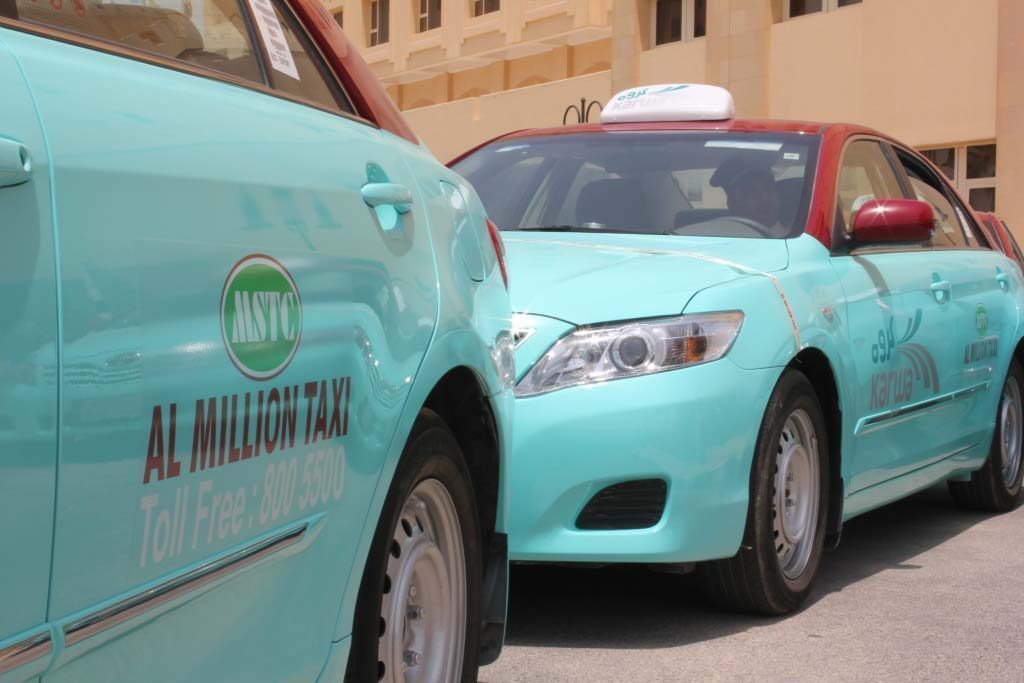
An unspecified number of drivers for Karwa taxi franchise Al Million refused to work on Saturday in protest of the daily fees they must pay their employer, the Peninsula reports.
Some of the company’s drivers are contractually required to rent their taxis from the company on a daily basis – QR235 for 12 hours or QR300 for 24 hours. According to the newspaper, complaints have been made to management that the charges are too high to make a decent living, when fuel costs are taken into account.
One Sri Lankan driver who chose to strike on Saturday told the paper:
“We are asking the company to reduce rentals to QR200 and pay for the fuel or fix rentals at QR180 when we pay for petrol. The QR300 rental for 24 hours needs to be reduced to QR250.”
The company was notified of the action yesterday, the day after the strike took place, he said.
Such civic action is rare in Qatar, where expats are prohibited from forming trade unions. According to Amnesty International:
Under the Labour Law (Article 116) only Qatari workers are allowed to form workers’ associations or trade unions.
Qatar has an obligation under Article 5 (e) (i) of the International Convention on the Elimination of Racial Discrimination, to which it is a state party, to guarantee the right of everyone, without distinction as to race, colour, or national or ethnic origin, to equality before the law, in the enjoyment of ‘the right to form and join trade unions.’ “
Qatar’s Labor Ministry has said it is setting up a committee to study the issue of establishing such groups, but progress remains slow.
It also appears that the weekend’s rainy weather may have led to the unauthorized job action going unnoticed, with the same driver adding that no one from management had contacted the drivers when they failed to turn up for work on Saturday.
When asked about the strike, an unidentified member of Al Million management told the Peninsula that he had heard nothing about the apparent action, and speculated that the weather may have been the cause:
“Many of our drivers prefer to take their day off on Saturdays or Sundays. Some taxis were off the roads on Saturday due to continuous rains.”
The Peninsula reports that some taxi drivers may still be on strike, but that most returned to work last night.
Doha News was unable to speak to anyone at Al Million’s corporate office or call center who would comment on the apparent strike.
Fleet
Amid regular complaints about a lack of available taxis, national transport regulator Mowasalat has increased the number of Karwa cars and added two additional taxi operators, which run as franchises – Al Million and Al Ijarah.
These companies must charge the same rates as their all-green counterparts, but operate separate call centers.
Launched in the summer of 2012, Al Million now has about 650 taxis and employs around 1,000 drivers.
When its maroon-roofed taxis first hit Doha’s roads, Al Million management promised an “enhanced consumer experience,” including GPS, and said it would install technology that prevents overcharging.
Plans to introduce another Karwa taxi brand experienced a setback last summer when the launch of a third franchisee, Petro Qatar, was canceled due to licensing issues.
Complaints
Government-regulated taxis continue to provoke the ire of many residents, with many complaining of overcharging (often connected to a “broken” meter), drivers getting lost and others refusing to pick passengers up if their journey is short.
Several published reports have found that some drivers feel they are forced to act fraudulently to make enough money to cover their debts and daily car rental fee.
Last November, local news website JustHere published a story featuring the plight of a group of Kenyan Al Million drivers, who claimed they’d been brought to Qatar on false contracts which promised far higher wages and better living conditions than they’d received on arrival. All drivers at Al Million are moved onto a “rental contract” once their first three months of employment are up, the report says.
The drivers interviewed allege that they signed different contracts in their home countries that promised them a salary three times as high; live in unsanitary conditions without proper washing facilities; are fined if they have an accident or commit a traffic violation; and that many work extremely long hours, risking fatigue to make extra money.
In response, a representative of the company which recruited the men in Kenya, Magtech, told JustHere that an Al Million representative had given prospective employees accurate salary information and details of the company’s rental system before they had agreed to take the job.
In a separate piece, journalist Jessica Davey-Quantick argued in a Doha News guest post last year that many taxi drivers are merely desperate to make enough money to cover their costs.
Her investigation focused on non-franchise taxi drivers, and demonstrated that their rental costs are largely similar to those paid by drivers working for Karwa’s franchises.
Karwa told her that salaried drivers make QR6,500 a month, with “rental drivers” making an estimated QR11,700, or QR4,810 once they’ve paid for their cabs – at a cost of QR265 per day.
However, the estimate is based on a QR450 daily target, which drivers told Davey-Quantick was almost impossible to reach.
“To reach the company’s estimated daily earnings, they would have to have one trip every half hour for their entire 11-hour shift, with no breaks and no lulls between passengers, lower fares, or longer trips,” she writes.
Are you an Al Million customer? Thoughts?







